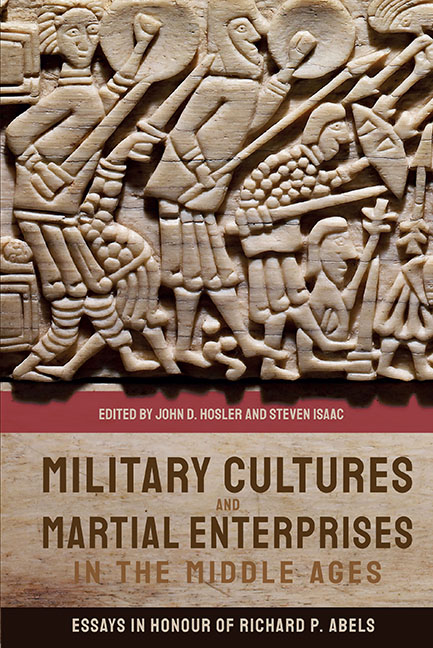Book contents
- Frontmatter
- Contents
- List of Illustrations
- Notes on Contributors
- Introduction and Appreciation
- 1 Charlemagne’s Invasion of Spain in 778: The Anatomy of a Strategic Failure and its Impact
- 2 Military Intelligence and Strategic Planning Under the Ottonian Kings of Germany, 919–1024
- 3 Ain’t Nobody Here But Us Chickens: Defeated Warriors, Masculinity, and Mistaken Identity in Western Europe, 679–1141
- 4 Count Baldwin V of Flanders: Broker of Eleventh-Century Power
- 5 Kings and Fortuna: The Meanings of Brémule
- 6 Fighting the Last War: Remembering the Norman Conquest during the Anarchy
- 7 Gilbert of Mons’ Chronicle of Hainaut as a Source for Military History in the Twelfth Century
- 8 At Home with Roger of Howden
- 9 Embedded Reporters? Ambroise, Richard de Templo, and Roger of Howden on the Third Crusade
- 10 The Treatment of Male and Female Prisoners of War during the Third Crusade
- 11 Exempla, Crusade, and Chivalry
- 12 Frontier Warfare in the St Omer Chronicle
- 13 Some Observations on the Training of Medieval Warhorses
- Richard P. Abels’ Curriculum Vitae
- Index
- Tabula Gratulatoria
10 - The Treatment of Male and Female Prisoners of War during the Third Crusade
Published online by Cambridge University Press: 21 October 2020
- Frontmatter
- Contents
- List of Illustrations
- Notes on Contributors
- Introduction and Appreciation
- 1 Charlemagne’s Invasion of Spain in 778: The Anatomy of a Strategic Failure and its Impact
- 2 Military Intelligence and Strategic Planning Under the Ottonian Kings of Germany, 919–1024
- 3 Ain’t Nobody Here But Us Chickens: Defeated Warriors, Masculinity, and Mistaken Identity in Western Europe, 679–1141
- 4 Count Baldwin V of Flanders: Broker of Eleventh-Century Power
- 5 Kings and Fortuna: The Meanings of Brémule
- 6 Fighting the Last War: Remembering the Norman Conquest during the Anarchy
- 7 Gilbert of Mons’ Chronicle of Hainaut as a Source for Military History in the Twelfth Century
- 8 At Home with Roger of Howden
- 9 Embedded Reporters? Ambroise, Richard de Templo, and Roger of Howden on the Third Crusade
- 10 The Treatment of Male and Female Prisoners of War during the Third Crusade
- 11 Exempla, Crusade, and Chivalry
- 12 Frontier Warfare in the St Omer Chronicle
- 13 Some Observations on the Training of Medieval Warhorses
- Richard P. Abels’ Curriculum Vitae
- Index
- Tabula Gratulatoria
Summary
WHETHER OR NOT IMAD AL-DIN was exaggerating when he claimed that in 1187, the year of Hattin and the conquest of Jerusalem, Saladin freed 20,000 prisoners and captured 100,000, there is no doubt that the fate of prisoners of war played a considerable role in the diplomacy and political maneuvering of the period. According to Ibn al-Athir, widely acknowledged as the most impartial Muslim historian of the time, Saladin's decision to release some of Count Raymond of Tripoli's knights had materially helped to precipitate the whole dramatic sequence of events:
He held several of the Count's knights as prisoner and these he released. This made a very great impression on the Count who gave open allegiance to Saladin. Thus their unity was disrupted and their cohesion broken. This was one of the most important factors that brought about the conquest and liberation of Jerusalem.
Whether or not this particular act of Saladin's had quite as much impact as Ibn al-Athir thought, the prisoner question was undoubtedly central to the climax of the Third Crusade: the surrender of Acre on 12 July 1191 and the agreement that the garrison would be freed in return for 1,600 of Saladin's prisoners, the Holy Cross, and a ransom of 200,000 dinars; then, after the breakdown of negotiations, the brutal aftermath: the massacre of the greater part of the garrison on 20 August. No one has demonstrated more effectively than Richard Abels how the ways in which prisoners of war were dealt with can be made to reveal a great deal about a society's norms, values, institutions, and mentalities. Given that the treatment of those defeated in crusading warfare occupied a central place in his 2008 article on cultural representation and the practice of war, I hope that this chapter can serve as a counterpart to that one – especially since, like him, I too have vivid memories of the flow of that conversation between us, Bernard Bachrach and Stephen Morillo, over a sufficiency of beer and curry, to which he attributed the germ of the idea for his paper.
- Type
- Chapter
- Information
- Military Cultures and Martial Enterprises in the Middle AgesEssays in Honour of Richard P. Abels, pp. 192 - 210Publisher: Boydell & BrewerPrint publication year: 2020



